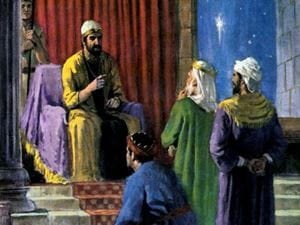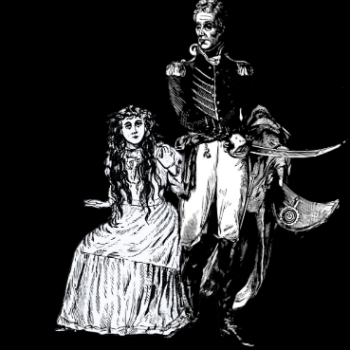
No two journeys to Bethlehem, from one Advent season to the next, are truly the same.
This time of year, we return to the lowly stable, where familiar scenes greet us. It’s been fully twelve months, but all those lambs are as cute as ever! Not once, in that whole time, have St Joseph and the Virgin Mary lifted their eyes from the Holy Child. Everything, down to the final blade of yellow straw, looks identical. We, however, with another year’s highs and lows behind us, have changed.
When it comes to the Gospel accounts of what happened on that first Christmas, the lens through which we see things really matters. Details in the text — even supposedly trivial points, which in previous years might have passed us by — may, because of experiences in the meantime — life’s battles, lost and won — seize our attention and reveal fresh light as never before.
Some verses hit rather different in light of recent world events. Two months on from the largest massacre of Jews in a single day since the Holocaust, an example would be this: ‘And you Bethlehem, in the land of Judah, are by no means least among the rulers of Judah; for from you shall come a ruler who is to shepherd my people Israel’ (Matthew 2.6). May God speed the people of Israel, then; watch over her armed forces; and serve justice on the tormentor, Hamas.
On a more trivial plane, our leisure activities also have an impact on our biblical engagement. I’m a big reader, you may have guessed; and this year, I finished A Game of Thrones by George R. R. Martin. I was utterly gripped. You’ve almost certainly heard of, if not seen, the similarly titled HBO series, Game of Thrones, which ran until 2019. Much of it was filmed in beautiful Northern Ireland, where I live!ne
Game of Thrones is an epic fantasy, whose plot revolves around a number of powerful families. They’re all players in a high-stakes game – ‘a game of thrones,’ you could say! – for a single prize: the Iron Throne, whose occupant gets to rule the Seven Kingdoms. How badly do these bitter foes long to wear the crown, and what will they do to get it? You can see why, then, absorbed in tales of rival powers, I might’ve read the nativity this year with a new fixation on a certain king…
Herod’s dark shadow looms larger over St Matthew’s infancy narrative than St Luke’s. That’s why kids’ nativity plays hew more closely to the latter; in a school production, the theme of infanticide isn’t usually that well received. I refer, of course, to the Massacre of the Innocents: that episode in the Matthean account, where the King’s assassins kill every baby boy they can find.
In our own recent history, we don’t have to look far for examples of tyrants who had their own people slaughtered: Gaddafi, Milosevic, Saddam… Herod is a character in a specific story, but he functions as a plot device, too, within the wider biblical narrative: a counterpoint or dramatic foil to Jesus, the righteous king to Herod’s wicked ruler. Herod is an anti-Christ figure.
We call the Sunday before Advent Sunday ‘Christ the King Sunday.’ The traditional text for this occasion is Colossians 1.11-20, where St. Paul describes what sort of a monarch we have in Jesus: ‘For in him [Christ] all the fulness of God was pleased to dwell,’ the Apostle writes (v. 19), ‘and through him to reconcile to himself all things, whether on earth or in heaven, making peace by the blood of his cross’ (v. 20). Here we have a picture of true, not Herod-style, kingship!
Thanks to this passage, our expectations of what a king should be like are set exceptionally high by the time Advent arrives. Unsurprisingly, we find Herod’s tyrannical behaviour all the more despicable when set alongside, and in direct contrast with, Our Lord’s benevolence. His inflated sense of authority knows no bounds. In his hubris, Herod sends the Three Wise Men, guests in his land, on an errand for him, as though they were his personal flunkies. How rude!
Herod enjoys wealth and status in Jerusalem, whereas Christ is born to squalor and anonymity. The rejection at a Bethlehem inn – where people gather from every station in life, a lively microcosm of society – foreshadows the social exclusion that will become a pattern in the life of Christ: ‘He came unto his own, and his own received him not’ (John 1.11, KJV). Herod never experienced such ostracism – encircled, as he was, by cowardly throngs of sycophants and yes-men.
To finish this article where we started, with Game of Thrones, there are any number of unsavoury characters in Westeros, to whom we might compare to King Herod: Joffrey Baratheon, Gregor Clegane, Viserys Targaryen… What makes these characters, as well as Herod himself, persuasive as villains is that all their misdeeds are within our human capacity for evil today.
There are noble characters in Thrones as well: Jon Snow, Ned Stark, Sam Tarly… They have their flaws, to be sure, but ultimately their moral compasses are sound. These are the characters we should aspire to be like. None of them covets power for himself, and this is what sets them apart from the villains they share their world with. It also links them with Christ, ‘who, though he was in the form of God, did not count equality with God a thing to be grasped’ (Philippians 2.6).
Graham Kendrick famously described Our Lord, in the title of a popular worship song, as “The Servant King.” I can think of no finer meditation on the kingship of Christ, and on the compassion which radiates down from the heavenly throne, penned in the last few decades. Give it a listen, when you have time between the festivities!
And so, the Christmas journey begins again. Whether you breeze into Royal David’s City with a year of success at your back, or slouch towards Bethlehem beaten down by setbacks, know that all are welcome around the King’s table: from the wise man in his tower to the shepherd in his field, and everyone in between.
God bless you this Christmas time.
12/13/2023 11:02:25 PM





